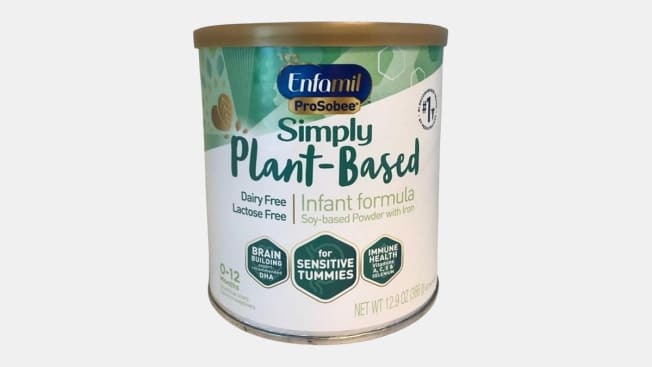Enfamil Recalls Powdered Baby Formula Due to Risk of Deadly Bacteria
The nationwide recall involves 145,000 cans of infant formula

Reckitt, the maker of Enfamil, has recalled two batches—145,000 cans in total—of 12.9-ounce cans of Enfamil ProSobee Simply Plant-Based Infant Formula, according to a release from the Food and Drug Administration. That’s because there’s a risk that the products may be contaminated with Cronobacter sakazakii, rare but life-threatening bacteria.
The recalled formula was manufactured between August and September 2022 and sold in stores in the U.S., Puerto Rico, and Guam. The products have batch codes of either ZL2HZF or ZL2HZZ, along with a UPC Code of 300871214415a and a use-by date of “1 Mar 2024” on the bottom of the can.
Given that the FDA release says no formula tested positive for Cronobacter, “the chance that this formula is contaminated is likely small,” says James E. Rogers, PhD, director of food safety and testing at CR. And in fact, illnesses caused by Cronobacter sakazakii are rare. Prior to the four illnesses linked to the Abbott formulas, the CDC says it received reports of only two to four cases of infants getting sick from Cronobacter per year.
Nevertheless, Rogers warns parents to dispose of the recalled Enfamil ProSobee Simply Plant-Based Infant Formula or return it to the store where they bought it for a refund. “It is better to err on the side of caution,” he says, “because Cronobacter can be life-threatening in infants.”
Signs of Cronobacter Infection in Infants
Cronobacter can easily contaminate foods. The FDA says it’s found naturally in the environment and can get into formula if the ingredients used to make it are contaminated or if the formula touches a surface that’s contaminated. Cronobacter can also survive for a year or longer in dry foods, like powdered infant formula and powdered milk.
For most adults and older children, the bacteria are harmless. But for premature babies, newborns, infants less than 2 months old, and infants with compromised immune systems, Cronobacter can be especially risky and cause potentially fatal illness.
Symptoms of Cronobacter infection include fever, poor feeding, excessive crying, or very low energy, according to the CDC. An infant may also become jaundiced, have abnormal body movements, or make grunting sounds when breathing. Those are signs to seek immediate medical help, the FDA says. In more advanced cases, the bacteria can cause a blood infection and sepsis, as well as swelling around the linings of the brain and spinal cord, also known as meningitis.
















